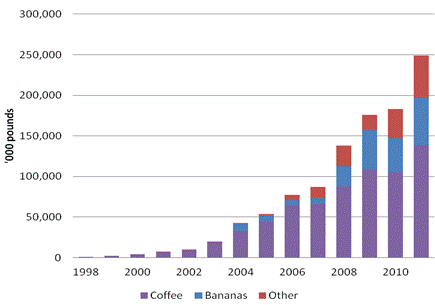

About Fairtrade:
Fairtrade is a social movement (a group campaign in support of one supreme social goal)that aims to achieve fairer conditions for the producers in LEDCs (low economically developing countrys) and therefore promotes sustainability in these countrys as these producers work to improve the communities. Any company which has achieved the fairtrade certification, shown by the logo, gives:
more suitable prices, better working conditions and a fairer trade for their producers. They cover protection of the workers’ rights and the environment, payment at the Fairtrade Minimum Price and an additional Fairtrade Premium to invest in business or community projects, it is also used to improve the quality of the products: 25% of Fairtrade coffee plantation premiums are used for this.
Where you come in
Shockingly, 20% of UK inhabitants do NOT recognise the fiartrade logo, perhaps if they did 40% of Africa would NOT live in poverty! To spread awareness and conquer this issue fairtrade fornight is aranged every year 23rd of Feb to 13 Mar, where MEDCs make an especially great effort to contribute to the fight. So why not start now?
If more customers demand fairtrade certification it will force companies to create more posative envionments for their workers in order to sell their products.
This will be indicated to us by the fairtrade logo, seen above. It shows us all ingrediants used in the product were produced in a way to meet the fairtrade social, economical and environmental standards.
Join us on:

If you want to go one step further...Spread the word by persuading your school or workplace, town or church to become fairtrade. This will entail striving for the following five goals:
-
Set up a 'Fairtrade School Steering Group' (a group of representatives, 50% pupils at least, who will meet once a term to consider how progress and areas for improvement on these goals. They should then send a report to the fairtrade foundation!)
-
Commit to buying and using fairtrade products.
-
Write and adopt a fairtrade policy. (a policy should be adopted to include fairtrade in the developement plan of the school.)
-
Ensure the whole school learns about Fairtrade issues, by teaching it in classrooms.
-
Commit to promoting and helping the idea of Fairtrade in school and the community.
Fairtrade Products:
Fairtrade products will always be more expensive since, if the producer is to be paid more the factory manager also must be, as must the buisness owner. However they do not take an unfair cut but give the extra wage to the producers. This is known as the ripple effect, and in this case it is a positive one; creating a fairer community.
In 2012 1.5 Billion pounds was spent on fairtrade products yet this is only £1 per household per week!
The future of fairtrade:
Reassuringly, the number of fairtrade products is growing! Between 2003 and 2007 the number of fairtrade certified products sold increased by roughly 2850, from 150 to over 3000!

A Bar Chart showing the growth in pounds in the UK annually of the money spent on fairtrade products.
Year
More facts and figures:
Our shelves are now stocked with 4500 fairtrade products!
-
Despite 70% of the worlds food being made by small farms, half of the worlds population that goes hungry are the farmers on these farms!
-
In 2012 £23million was generated for the fairtrade premium yet farmers on average use 46% of that money to improve and care for the crops they depend on
-
Less than 1% of coffee and sugar sales are fairtrade!
 |  |  |  |
|---|---|---|---|
 |  |





